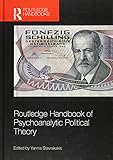Routledge handbook of psychoanalytical political theory / edited by Yannis Stavrakakis.
Material type: TextPublisher: New York : Routledge, 2020Description: xvii, 464 pages : illustrations ; 26 cmISBN:
TextPublisher: New York : Routledge, 2020Description: xvii, 464 pages : illustrations ; 26 cmISBN: - 9781138696310
- Handbook of psychoanalytical political theory
- 320.019 STA
| Item type | Current library | Collection | Call number | Status | Date due | Barcode | |
|---|---|---|---|---|---|---|---|
 Books
Books
|
H.T. Parekh Library | SIAS Collection | 320.019 STA (Browse shelf(Opens below)) | Available | K3532 |
Browsing H.T. Parekh Library shelves, Collection: SIAS Collection Close shelf browser (Hides shelf browser)

|

|

|

|

|

|

|
||
| 320.019 AHM Cultural politics of emotion / | 320.019 NUS Political emotions: why love matters for justice / | 320.019 POL Political psychology : a social psychological approach / | 320.019 STA Routledge handbook of psychoanalytical political theory / | 320.03 ROB Dictionary of political analysis / | 320.082 ENL Bananas, beaches and bases: making feminist sense of international politics / | 320.0820954 GEN Gender and governance: perspectives from South Asia / |
AT/3010236/179
GBP190/-
Includes bibliographical references and index.
IntroductionYannis Stavrakakis PART 1: FIGURES1. Sigmund FreudStephen Frosh 2. Melanie KleinR. D. Hinshelwood 3. Jacques LacanDomiek Hoens 4. Wilhelm ReichChristopher Turner 5. Carl JungPeter T. Dunlap PART 2: TRADITIONS6. Marcuse and the Freudian LeftDouglas Kellner7. The Lacanian LeftSean Homer8. Psychoanalytic FeminismLisa Baraitser9. Critical Management StudiesAlessia ContuPART 3: CONCEPTS10. Superego and the LawTodd McGowan11. (Liberal) NarcissismBob Samuels12. Affect and EmotionCandida Yates13. TraumaMarshal Alcorn14. FantasyMatthew Sharpe and Kirk Turner15. Identification (With the Aggressor)Jay Frankel16. Mourning and MelancholiaClaudia Lapping17. Language and DiscourseEd Pluth18. Collective SubjectsCampbell Jones PART 4: THEMES19. SexualityEran Dorfman20. HateC. Fred Alford21. RacismDerek Hook22. NationalismAmanda Machin23. CapitalismSamo Tomsic24. Consumerism and ChoiceRenata Salecl25. Religion and Islamic RadicalizationAndrea Mura26. PopulismPaula Biglieri and Gloria Perello27. ArtsCecilia SjoholmPART 5: CHALLENGES AND CONTROVERSIES28. Psychoanalytic GeopoliticsDany Nobus29. Psy EthicsIan Parker30. NeoliberalismValerie Walkerdine31. Migration and DiversityNikolay Mintchev and Hernrietta Moore32. BiopoliticsA. Kiarina Kordela 33. The Climate CrisisSally Weintrobe 34. Post-politicsOlivier Jutel35. Posthuman IdentitiesAnthony Elliott.
"The emerging field of 'psychoanalytic political theory' has now reached a stage in its development and rapid evolution that deserves to be registered, systematically defined and critically evaluated. This Handbook provides the first reference volume which showcases the current state of psychoanalytic political theory, maps the genealogy of its development, identifies its conceptual and methodological resources and highlights its analytical innovations as well as its critical promise. The Handbook consists of 35 chapters offering original, comprehensive and critical reviews of this field of study. The chapters are divided into five thematic sections: - Figures discusses the work of major psychoanalytic theorists who have influenced considerably the development of psychoanalytic political theory. - Traditions genealogically recounts and critically reassesses the many attempts throughout the 20th century of experimenting with the articulation between psychoanalysis and political theory in a consistent way. - Concepts asks what are the concepts that psychoanalysis offers for appropriation by political theory. - Themes presents concrete examples of the ways in which psychoanalytic political theory can be productively applied in the analysis of racism, gender, nationalism, consumerism, etc. - Challenges/Controversies captures the ways in which psychoanalytic political theory can lead the way towards theoretical and analytical innovation in many disciplinary fields dealing with cutting-edge issues. The Routledge Handbook of Psychoanalytic Political Theory will serve as scholarly reference volume for all students and researchers studying political theory, psychoanalysis, and the history of ideas"-- Provided by publisher.
There are no comments on this title.


